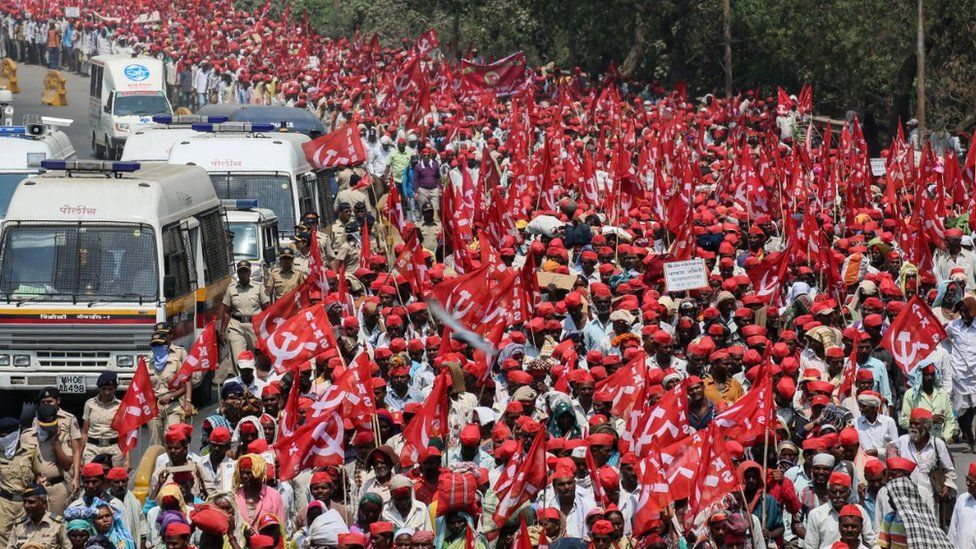Farmers in India have had enough of the Modi government’s anti-farmer reforms. Farmers have set up camps and occupied Delhi borders since November 2020 in protest against agriculture laws passed in September. At the time of writing the protests were continuing with no intention to stop until demands are met.
The farmers protest under the banner of Samyukta Kisan Morcha, a united front of 41 farmer unions. Initially there were two months of local state protests, mostly in Punjab and Haryana. Farmers unions then organised a march to Delhi. Tens of thousands of farmers joined the march where they met opposition from police. There followed a nationwide general strike on 26 November. Since the march farmers have occupied Delhi, camping at Delhi’s borders. Hundreds of thousands of farmers have poured into the capital. On 26 January 2021, India’s Republic Day, farmers held a ‘Tractor rally’, bringing their tractors into the city to protest.
In September three farming bills were passed by the Indian Parliament:
- The Farmers Produce Trade and Commerce (Promotion and Facilitation) Bill 2020
- The Farmers (Empowerment and protection) Agreement on Price Assurance and Farm Services Bill 2020
- The Essential Commodities (Amendment) Bill 2020
The bills were passed as a part of a Covid-19 relief package meant to provide immediate relief to the economy. But the move has been criticised as being ushered through in a time of crisis in an attempt to avoid opposition. “They believed that if you smash through these reforms at this time, the workers and farmers would not be in a position to organize against them,” said journalist P Sainath, as reported by Peoples Dispatch. The BJP government did not consult farmers before passing the bills. The bills allow corporations to take hold of the agricultural sector.
How farming in India usually operates is that the markets that farmers trade at are a state-run APMC (Agriculture Produce Marketing Committee). Produce is bought by licenced middlemen at these markets, who then sell the produce on to local vendors or food processing industries. “Price Discovery” occurs at the markets, where the farmers find out the price of their produce according to demand. Negotiation over selling happens according to the set price. If nobody else buys the produce, the government will buy the produce at a minimum support price (MSP). The MSP acts as a welfare safety net for farmers.
With reforms in the bills farmers can privately sell outside APMC markets. Private markets can be set up exempt from taxes, fees, and the usual licences buyers must possess. The reform had already operated in several states and were now being implemented nationally. According to The Indian Express, in Bihar, where APMC markets were abolished in 2006, farmers received lower prices than the MSP for most crops. Hence the reason why farmers fear that big corporations will be able to force farmers to sell crops at a low price without state intervention.
Farmers fear that the neoliberal laws are a stepping stone to the abolition of the MSP. Already farmers are struggling under the current APMC system. With the introduction of the free market farmers fear exploitation by capitalists. The farmers demand the current APMC system is reformed rather than a parallel free-market system being introduced under the new laws.
There are further contentions by farmers around contract farming. The new law enables a farmer to be contracted to sell produce to a buyer at a predetermined price prior to sowing. The farmers’ opposition is due to the fact contract farming has not been beneficial in the past. According to The Wire the contracting firm holds power over the farmer and thus farmers are subject to indebtedness and loss of autonomy over land and livelihood decisions,
The primary demand of the farmers is the repeal of the three farming bills. The government has attempted to compromise with the farmers’ unions, offering to suspend the laws for 18 months and to amend the legislation to leave registration of markets to individual state governments. But farmers’ unions have come away from mediation meetings sticking to their demand for repeal.
Among other demands, the farmers also want the government to pass new legislation which makes MSP a legal right, and for MSP to be set at 50 percent more than the cost of production. The BJP had previously made the latter demand a campaign promise but it has not fulfilled it.
The farmers deserve the right to survive, and deserve freedom from exploitation by corporations.
The majority of farmers in India already face the problem of not having the land capacity to make a profit from selling produce, which makes farming an unreliable source of income. Without the MSP farming would be made even more difficult. India has a farmer suicide crisis due to indebtedness.
Since 2014 the far-right Bharatiya Janata Party (BJP) has governed India, with Narendra Modi as the Prime Minister.
The governing party has failed to deliver on electoral promises and has already seen major protests against reactionary policies, such as the Citizenship Amendment Act in 2019.
Farmers have also protested in previous years, demanding MSP as a legal right. Farmers held the Kisan long march to Mumbai and the march to Parliament in Delhi in 2018.
Workers and students have protested in support of the farmers. Protesters blocked traffic and trains, farmers blocked and took control of highways, and seven borders were completely closed due to the protests. Police have used tear gas, batons, and water cannons against the farmers and protesters. BJP goons have physically attacked the farmers. Farmer leaders have been arrested. At least 120 protesting farmers have died so far, including by suicide.
There have also been protests in support of the farmers around the world. In December 2020 1,500 Indian New Zealanders protested in Auckland’s Aotea square in solidarity.
On 26 November 2020 approximately 250 million people (approximately 1 in 30 people on Earth) took part in a nationwide general strike. This has been reported as the largest strike in history. During the strike, public transport and shops closed in solidarity.
A general strike demonstrates that it is workers and toilers that keeps society running. Unity in action can bring the economy to a standstill. The solidarity of strikes raises class consciousness.
The farmers of India have been labelled terrorists and anti-national. This is sorely untrue; the farmers protest against injustice. This is class warfare. The farmers are using the weapon of solidarity against a rightwing government dedicated to neoliberalism. As such they are protesting in the interest of all workers, their natural allies.









